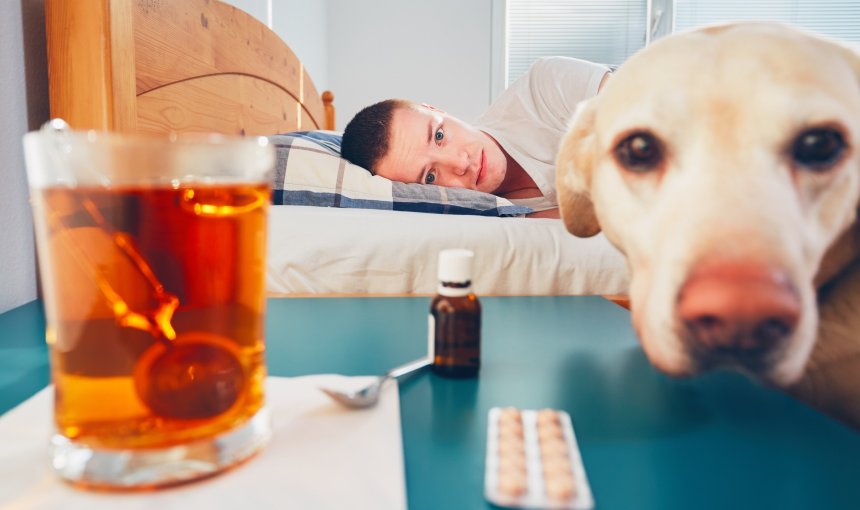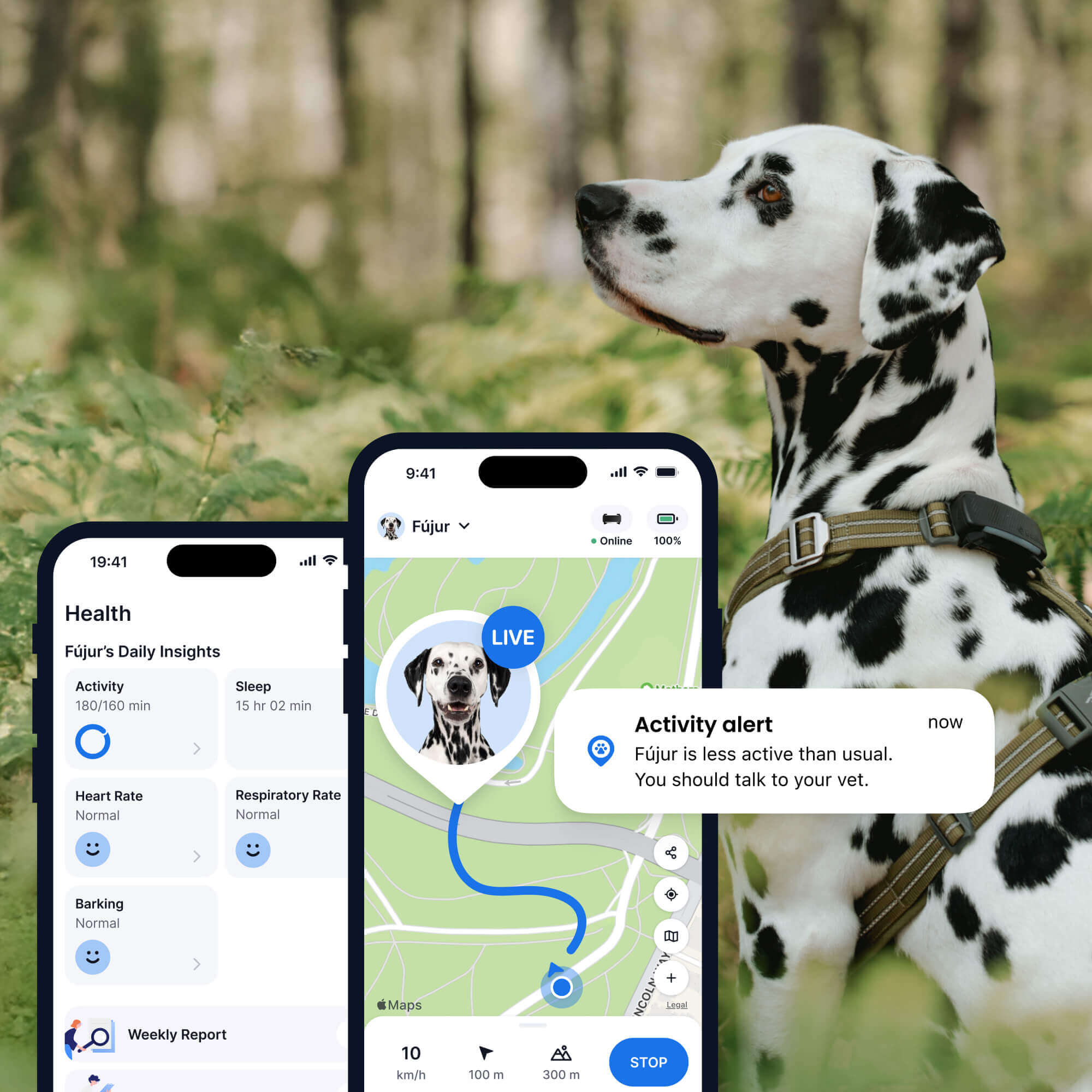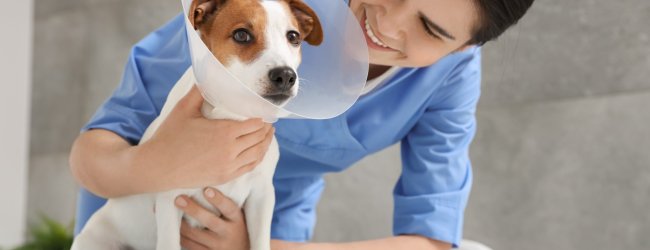 Approved by Dr. Dwight Alleyne, DVM
Approved by Dr. Dwight Alleyne, DVM Can Dogs Get Sick From Humans? (And Vice Versa?)
Wondering: can dogs get sick from humans? Turns out, we CAN pass on some illnesses to our buddies - and vice versa. Here they are - and what you can do to prevent them.

Can dogs get sick from humans? If you’ve ever asked yourself this question, it’s unfortunately both a yes and no. At least some of the illnesses that affect us we can pass on to our dogs – and some that we might pick up from our dogs! (Especially if you’re in contact with their food, poop, or even sleeping areas.) So here’s everything you need to know to keep the two of you healthy, including how to catch on to a sickness in your dog before it has a chance to worsen.

Always know your buddy is healthy & safe
Read moreCan dogs get sick from humans? And how?
In a nutshell, there are some illnesses you can pass on to your dog – while some you can’t. (Especially when you’re sharing a home, sleeping area, and even some of our meals with our buddies.) Here’s a quick distinction:
| Illnesses humans can pass on to dogs | Illnesses humans don’t typically pass on to dogs |
| Fungal diseases, like ringworm | The common cold2 |
| Bacterial infections, like salmonellosis, MRSA1 and even tuberculosis | Other viral infections, including norovirus, hepatitis, and mononucleosis |
| COVID-19 | Lyme disease |
| Influenza | Cold sores |
Some other illnesses, like mumps, can also pass from humans to dogs – but you’re both safe if you’ve gotten your vaccinations. Besides, even if it isn’t you passing your illness on to your dog – it may well be someone else your buddy is coming in contact with outdoors. Like your neighbors, fellow dog parents, your friends and family members, and more.
Can dogs get colds – from humans?
While yes, dogs can get colds in general – it’s unlikely they’ll pick up one from you, their human. Meaning the chances you’ll pass on your cold to your buddy is pretty low. (Phew!)
At the same time, though, dogs can still catch more serious infections – like bronchitis – from sources besides you. (Like from direct contact with other dogs, or from a boarding facility, or even food or water bowls infected by it.)3 Commonly known as kennel cough, canine infectious tracheobronchitis can lead to cold-like symptoms like coughing, sneezing, and fatigue.
What about the flu? Can I pass it on to my dog?
Given how adaptable the flu virus is, it’s likely you can pass some strains of the flu virus to your dog.4 In fact, a 2014 study found that dogs might catch on to the H1N1 and H3N2 strains of flu from humans.
⚠️ More importantly, canine influenza is a dog-specific variety of this illness you should watch out for.5 Your buddy is more likely to pick it up from contact with other infected dogs – or contaminated surfaces. Its symptoms are similar to human flu, including:
- A lingering cough persisting from anywhere between 10-30 days
- Sneezing
- Fever
- Discharge from your dog’s eyes or nose
In some specific cases, your dog might pass on certain flu strains to other animals as well – like cats. Make sure to drop by your vet immediately if you notice any of these symptoms.

Get health alerts for your dog
Our pups can’t always tell us if something’s wrong. But if their tracker detects unusual changes in their routine, you’ll get an alert, helping you catch potential issues early.
I’m the one who’s sick – what should I do if I have pets at home?
First things first, it’s always a good idea to check both with your vet as well as your GP. This can help you determine whether you can keep your dog at home with you – or if it’s better to have someone else take care of them for a few days. For example, if you’ve just got a cold, it’s fine to keep your buddy around since you aren’t likely to transmit it to them. But if it’s a more serious flu, it might be better to have a friend or family member take your buddy in for a few days as you recover.
Likewise, if it’s a disease you can pass on to your dog, keep your distance and avoid feeding your buddy as much as possible. Rather, it’s better a pet sitter, friend, or family member feeds your buddy and takes them out on walks and toilet breaks as you get better.
If you’re the only one who can feed your dog at this time, make sure to mask up and wash your hands carefully before handling your dog’s food.
Can humans get sick from dogs?
So far, there are no reported cases of humans getting the flu from a dog – but there’s plenty else your buddy can pass on to you if you’re not careful.6 Including:
- Bacterial infections
Like brucellosis, leptospirosis, and salmonellosis. Many of these can cause flu-like symptoms in humans, as well as digestive symptoms like diarrhea and cramps. - Fungal diseases
Like ringworm, which can cause itching and swelling. - Parasitic diseases
Like hookworm, roundworm, and tapeworm – all of which can cause digestive symptoms like diarrhea, nausea, vomiting, and cramps.
Where are you likely to pick up these kinds of illnesses?
When it comes to dogs getting sick from humans, you’re likely to come in contact with these infections from:
- Your dog’s poop – especially if you don’t wash your hands thoroughly after.
- Your dog’s urine, including infections like leptospirosis.
- Your dog’s fur, especially if they have fleas. (Though usually, these infections don’t last long.)
- Bites and scratches, including bacteria like capnocytophaga which can lead to blisters, swelling, and pain.
- Soil that’s been contaminated by your dog’s feces, like if your buddy is in the habit of doing their business in your backyard – and you’re a fan of gardening.
- Contaminated water, especially infections like giardiasis. Your dog can also pick it up from drinking water and other water bodies, including lakes, streams, swimming pools, and even spas.
- Contaminated surfaces, including your dog’s food and water bowls – and even sleeping areas. (Especially if you sleep on the same bed as your dog – though it’s less likely to occur.)
- Contact with other dogs that might be infected, like from dog parks, boarding facilities, vet clinics, and elsewhere.
How can you prevent your dog from picking up an infection?
With these practical steps, you can go a long way in keeping both you and your buddy infection-free – no matter the season.
Be extra mindful during (and after) outdoor time
It might seem obvious, but even a moment’s negligence after cleaning up after your dog – or once you’re both back from the outdoors – can potentially make you both very sick. So make sure to:
- Train your dog to do their business in a separate area from anywhere you (or other humans or animals) might come in contact with. Like the corner of a sidewalk or in a patch of your backyard a bit away from where you garden.
- Use gloves to pick up your dog’s poop – and wash your hands thoroughly after!
- Clean your dog (and yourself) thoroughly after you’re both back from your walks, runs, or hikes outdoors together.
- Double check with other dog parents first if you can pet their dogs. Some might not welcome contact from a stranger and might bite or scratch you in defence. (Which can potentially transmit some infections to you.)
- Warn other dog parents before they pet your dog, in case yours doesn’t like contact from strangers. Our post on how to stop a dog from biting has some helpful tips for preventing any bites or scratches.
Keep in regular touch with your vet
Especially when it comes to getting your buddy their vaccinations, regular checkups, and preventive checkups in case you notice something off about your dog’s behavior. Your vet can best advise you when to get your dog their shots – including what for. They can also thoroughly examine your dog for any parasites, infections, and disease.
💡Besides regular checkups, it’s also a good idea to get your dog over to the groomers periodically. Some dogs might need more brushing than others – but regular grooming can help you keep their fur clean and prevent matting and tangling. (Which can attract pesky critters like ticks, fleas, and mites.)
Watch out for changes in your dog’s behavior
No matter the breed, dogs are generally full of energy. This makes it easier to understand when your pooch may not feel fit. Your dog might be sick if they:
- Show a loss of appetite
- Drink less water
- Seem lethargic or less active than usual – seeming more reluctant around walks and playtime
- Have a fever (especially if they have a warm, dry nose)
- Are sniffling, sneezing, coughing, or gagging
- Losing fur, including excessive scratching or shaking their heads (which might indicate an ear infection)
- Seem uncharacteristically aggressive – barking or even biting seemingly out of nowhere, especially if you try petting them. (Which could signal pain.)
Use a smart health tracker for dogs
💡Tracking your dog’s activity can be one of the simplest, most practical ways to catch on to an illness, infection, or even pain – much in advance. (Before it worsens and now you’re stuck with a higher, thoroughly avoidable vet bill.)
“Keep track of your dog’s energy levels, especially how long they are able to walk.
If you notice significant declines, it could be a sign of pain, heart disease, or other illness.”
– VCA Animal Hospitals7
With its built-in motion detector, the Tractive GPS & Health Tracker for dogs tracks your dog’s activity and sleep levels throughout the day. Figuring out what’s a normal level of activity for your dog – and alerting you much in advance if there’s a weird spike or drop in their active minutes. (Which could signal something’s wrong.)
With some extra care and attention to your dog’s hygiene, regular checkups at your vet, and watching out for changes in your dog’s behavior – you can prevent your buddy from catching on to something infectious much in advance.
Your furry friend’s health and wellbeing means as much as to us as it does to you. So we’ve made it a priority to only share medically-relevant content on our blog. This post was checked, double-checked, and medically verified by Georgia-based vet, Dr. Dwight Alleyne.

Dr. Dwight Alleyne, DVM
Originally from Long Island, New York, Dr. Alleyne began his career at a no-kill animal shelter before becoming a licensed veterinary technician. He graduated from Cornell University Veterinary College in 2006 and completed an internship at Purdue University. Now practicing in Georgia, Dr. Alleyne specializes in soft tissue surgery and ultrasounds. He also writes pet health articles on his website, “The Animal Doctor Blog” (www.anmldrblog.com).




